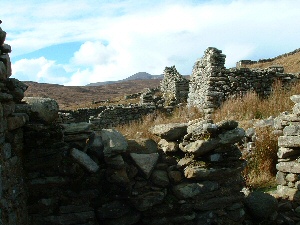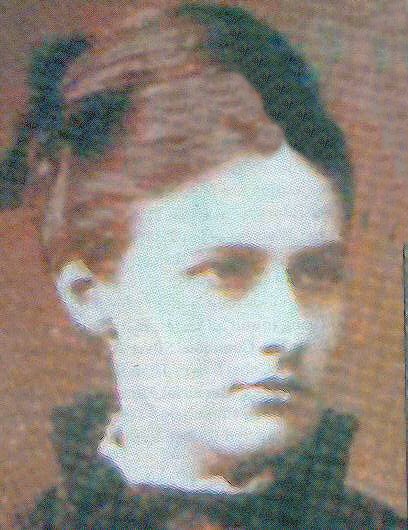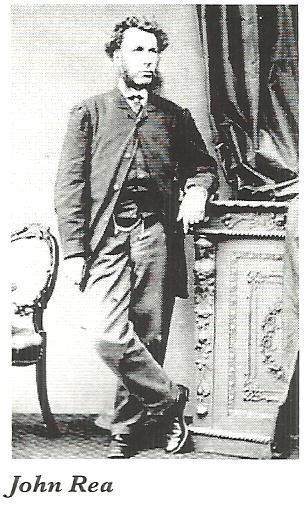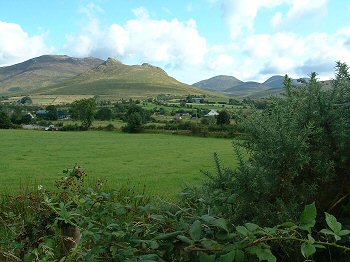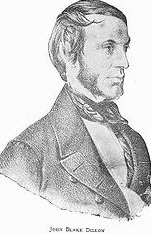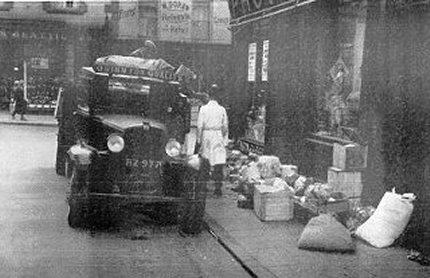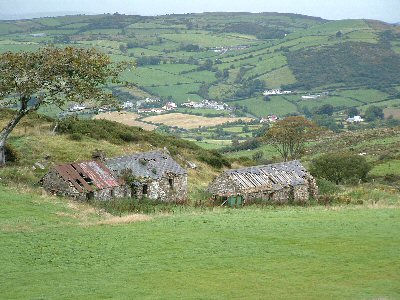The disgraceful extended incarceration of four Mayo farmers for protesting the danger to their lives and families from Esso’s high-pressure gas-lines running contiguous to their homes, brought to mind the similar treatment of their forebears a century and a half ago from occupation landlords.
1800-1900
Jenny Mitchel
She was the daughter of Mary Ward who was herself the daughter of a coachman on the Church Hill estate of the Verners of Loughgall. Indeed one of these Verners was the first Grand Master of the Orange Order in the previous generation.
Another Young Irelander : John Rea
John Rea
Born: 1822, Millfield area of Belfast
Died: May 17, 1881 – suicide by gunshot
Father: Francis REA
Mother:
Married: Never married
A man of many parts, he served nine months in Kilmainham Jail in 1848. He defended John Mitchel, acted for the Catholics after “Dolly’s Brae” and defended Michael Davitt in in 1879 in Sligo courthouse.
He once famously referred to himself as, “Her Orthodox Presbyterian Brittannic Majesty’s Orange Fenian Attorney – General for Ulster.”
For quite some time, I didn’t know who this John REA might be and why his photograph was in an album of family photos that centered on the family and friends of the JACKSONs of Urker, Crossmaglen. Fortunately, I posted the photo in my “Mystery Photos” and Mark DOYLE, a doctoral student in Boston who is completing a dissertation on mid-19th Century Belfast History, was generous in sending me more than a dozen pages describing the tempestuous life of John REA. Apparently, the photograph of him is rare.
My guess is that John REA’s defence of John Mitcel and of members of the Irish Land League would have been one of the aspects of his life that endeared him to the JACKSON family and the reason that he was included in their photo album. Daniel Gunn BROWNE (husband of Margaret JACKSON and passionate advocate for tenant farmers) as well as many of the other JACKSONs were noteably active in this movement.
Weekly Northern Whig May 21, 1981
“The tragical end of Mr. John Rea has created a profound sensation in Belfast and in the province of Ulster. He was, perhaps the best-known man in this town, for he has been before the public eye for thirty-four years with hardly an interval, and has always arrested attention by his eccentric personality and his extraordinary actions.
Yet he was a solitary man through life. His great vanity hardly allowed the possibility of companionship; his erratic course in politics still more isolated him; and the very consciousness that he had little work to do in the world, except in the way of attack, made him go much alone. Mr. Rea was a man of great powers, but with the slightest possible ballasting for so strong a brain, and thus his life, judged even from the most lenient standpoint, was a melancholy failure. He might have been a wealthy man, in the exercise of his profession, in a town where many solicitors, as young as himself, have made large fortunes, but, so far as anybody knows, Mr. Rea has died a poor man.
He had no power of concentration upon anything, and the plan of his life was, in many respects, like his speeches, very discursive, and without object. He had a bizarre streak in his intellect, which, along with wonderful powers of wit and sarcasm, made men listen to him for hours with an interest not to be accounted for by the solid results of his interminable talking. Often the zig-zag lightning of his brain upset the gravity of his gravest judges, his sternest critics, and his bitterest enemies, and led many a one to wish that he had had a steadier judgment to control the working of such unique powers.
“Mr. Rea was swept as a young man into the Young Ireland enthusiasm that carried away so many promising young Irishmen five-and-thirty years ago. There was Nationalism in his very blood. His grandfather was a character in his day, and made his mark very visibly felt about Saintfield in 1798. But it would be difficult to say that Mr. Rea had any steadfast appreciation of political principles through life. It would be difficult to say, indeed, what he was in politics. We suspect that his changes of opinion, if indeed he had any opinions, were determined by personal collisions with members of the various parties he supported, who could not get him to work harmoniously with them to any serviceable result.
Thus he was Young Irelander, Liberal, Cromwellian, and Orange Conservative, by turns, till at last it would be difficult to say that he was anything but a reckless and meaningless critic of everything done in town. His terrible appetite for talk led him to seek election to the public boards, and wherever he succeeded in making an entry there was a virtual end of business. He drove chairmen to despair, and struck round him with a reckless vehemence that often recalled the humours of Donnybrook, for there was wit in all his malice, and to the last he could get a hearing from the working classes of the town, who always had a relish for his plain-speaking and the dash of libel that ran through his public addresses.
“It is very sad to think of the tragical end of such a career. The Coroner’s inquest throws no light upon the cause of his death further than that he perished by his own hand in a fit of insanity. He had been in dull spirits for some weeks back, owing, it is suggested, to his want of success at the Poor-law elections. There always comes a time in the life of such a man as Mr. Rea when disappointments of this sort have a depressing and unhinging effect upon them. The spring and elasticity of life are gone, and strokes that twenty years before would make no impression fall with killing effect.
It is sad, too, to think of the solitariness of his death. Of course, as Voltaire says, every man dies alone; but there seemed to be a special solitude here. There was nobody at hand to attend to his wants or to say a kind word that might have broken the spell of heaviness which brought on the disastrous close.
Belfast will miss John Rea even in the midst of all its gravities and its hurries. He gave a bit of colour to our sober Ulster life, and will be a memorable figure in the future traditions of Belfast.”
Weekly Northern Whig – May 21, 1981
“Reminiscences of Mr. John Rea.” (By one who knew him.)
“…Mr. Rea was a thoroughly good-natured man, as vain or egotistic persons usually are, and made it a point to please his company wherever he was. He had an irrepressible vivacity of talk in private that made him an agreeable companion, but unhappily he carried his public life too much into private society. …
Mr. Rea never married. I once advised him strongly to marry, and he said gravely, ‘Well, I think you are right. I will think about it.’ ‘But,’ said I, ‘you have no time to lose. When will you see about it?’ ‘Whenever I can get this Chancery suit settled.’ ‘And how long will that be?’ ‘I think,’ was his reply, with much gravity, ‘if it is properly managed, it might last five hundred years.’
… Everybody remembers his doings in the Belfast Town Council. He had a special antipathy to one gentleman, who had not studied his grammar to advantage in his youth. On one occasion, when this gentleman was discussing some point with vehemence, Mr. Rea rose up and said, ‘Mr. Mayor, I protest.’ ‘What do you protest against?’ ‘I protest against a verb not agreeing with its noun.’
Weekly Northern Whig May 21, 1981
Report of Rea’s death – town’s reaction:
“When the newsvendors commenced to shout the sad occurrence through the streets of Belfast on Tuesday evening there were very large numbers of persons who paid little heed to the noisy youths. The name of the well-known solicitor had in its time been associated with so many extraordinary events, and the newsboys in their desire for sales had been in the habit so frequently of playfully associating it with wondrous performances, that many pedestrians on the thoroughfares little thought that the fatal occurrence which was being bawled forth had really taken place.”
Yelverton Marriage Case
Like me, in browsing Newry’s history you may have read or heard some reference to the famous ‘Yelverton Marriage case’ and wondered what it was all about.
1848 Corgary/Ballylough
Householder Lists, South Down 1848 : compiled by Father Ryan (Administrator, Donaghmore 1848) Corgary: Ballylough …
Eliza Goddard, Russell’s love
Shortly we will feature a review of Francis Gallagher’s short biography of Thomas Russell. First a note on how Newry featured in his life.
Originally from Cork (son of a Church of Ireland decorated British army officer and a Catholic mother from Tipperary) Russell, who served with distinction himself in the Army before taking up a career as a librarian, was a phenomenon in many ways.
’48: the aftermath
If that had been the end of the historical contribution of Young Irelanders, then they would have been, as a body, assigned to a mere footnote in the annals of Irish history …
19th century reflections
Mary Feeney, one of eleven children born in Newry to Sarah and James Feeney, recounts anecdotes told to her by her mother about life in Newry close to the end of the nineteenth century.
‘My granny and grandfather moved to Newry from Belfast, where they lived above Hennessey’s Butchers in Bridge End Street. They had three children there and six more were born in Newry. My grandfather got a job in Newry Mineral Water Co which is what brought them all to Newry.
The family settled in Monaghan Street. My mother remembered Parnell coming to town. Her father played in the brass band that turned out to welcome the great leader of the Irish Party.
During the winter when fuel was hard to come by, they used to erect an Aunt Sally in their back garden. The GNR railway men when their train was passing by used to sling coal lumps at it to try and knock her over. All us children would gather up the coals after they left. Free coal!! Mum said the slogan then was, “Home Rule and Free Coal”.
She remembered the mummers (Wren Boys, she called them) coming round at Christmas.
“Hell’s Row, Bell’s Row, Riddell’s Row
The Devil’s Row
Three Straws across the well
Monaghan Row beats Hell”.
It went something like that! The people she remembered and spoke about included McCrinks, Willis’ Bakery, the first Milestone John Quinn, Flunkey Fegan and the O’Hare’s – that is probably the Commission Agent, Betting Shop family.
She used to go into the bakery and ask for a halfpenny bun. When the man behind the counter was not looking, she would turn on the treacle on top of the bun, and then run like hell’s blazes. Her mother sent her one night to the chemist’s for flea powder. The shop was closed so she shouted through the letterbox at the owner, telling him what she wanted. He shouted back at her, “Go home and let them bite you tonight, and come back tomorrow when we are open!”
She remembers going to Dempster’s Field to hear the British Army Band playing. Newry was a British Army garrison town in those days. History is repeating itself, says you!
She and her brother James went on a railway bogie to the scene of the Tynan Railway Disaster, when an excursion train full of children crashed and rolled down an embankment. Many lives were lost. She saw the bodies of little children being laid out on the side of the track.
Her brother James was educated at the Newry CBS and I have his Leaving Certificate dated 1894. it was signed by Brothers Brady and Nalet. He should have received a Royal Humane Certificate if they were being issued at that time for, according to my mother, he jumped from the viaduct to save the life of a young boy, and for his reward, he got sixpence. He fought in Mons in the Great War and came through unscathed but he died in Havana in 1927 after a dockside accident. He is buried in a Convent graveyard in Havana.
My mother died in 1968 aged 86 years. Her stories could fill a book.”
Crossmaglen Evictions 1888
The last two decades of the nineteenth century saw pivotal change that presaged the revolution to come. The founding of the Home Rule League in 1873 began a decade of agitation centring on this, and on the land question, under the leadership of Michael Davitt of the Land League.
Parnell led eighty-five Home Rulers at Westminster. John F Small’s election as nationalist M.P. for South Down followed the reform and extension of the franchise in 1884. The introduction of a bill by British Prime Minister William Gladstone in 1886 to grant Home Rule to Ireland precipitated a crisis. He had already set out on a course to settle the land question in Ireland. There was also the beginning of a Gaelic revival, and the Fenian question had never quite gone away. Yet all the while mass emigration continued apace and those who stayed on to work the land continued to labour under iniquitous landlords imposing rack rents for land that was never rightfully theirs.
